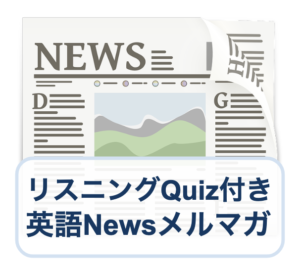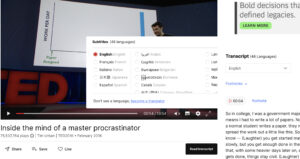自由時間をコントロールする方法【How to Gain Control of Your Free Time】

【TED Talks: How to Gain Control of Your Free Time】
「TED Talks」を視聴し、動画のテーマについて意見を述べる練習をしてみましょう。
今回のテーマは「自由時間をコントロールする方法」です。
 「TED Talks(テッド・トーク)」とは、世界中の専門家や著名人が「広める価値のあるアイデア(Ideas worth spreading)」をテーマに行う短いプレゼンテーションです。
「TED Talks(テッド・トーク)」とは、世界中の専門家や著名人が「広める価値のあるアイデア(Ideas worth spreading)」をテーマに行う短いプレゼンテーションです。
「Technology, Entertainment, Design」の略であるTEDという非営利団体が提供しています。
科学、教育、ビジネス、アート、ライフスタイルなど幅広いジャンルがあり、英語を学びながら考え方や価値観を広げる良い機会となるコンテンツです。
動画は主に5〜20分と短く、日本語字幕や英語スクリプトが用意されているため、英語初級者にも取り組みやすくなっています。
Step1: 動画の全体リスニング
▶まずは動画全体の要点を理解するリスニング訓練です。
次の正誤問題の答えを探しながら視聴し、「True(正しい)/ False(誤り)」 のどちらかを選びましょう。
Q1) The speaker says that people often overestimate how much time they spend on housework each week.(話者は、人々が週にどれだけ家事に時間を使っているかを過大評価していると述べている)
Q2) The speaker suggests that the key to time management is eliminating all low-value activities.(話者は、時間管理の鍵はすべての価値の低い活動を排除することだと提案している)
Q3) The speaker concludes that we can’t control our time because of unpredictable events.(話者は、予測不可能な出来事のために私たちは時間をコントロールできないと結論づけている)
※歯車アイコン(⚙)→「字幕」→「英語」や「日本語」を選択可能です。
How to Gain Control of Your Free Time(自由時間をコントロールする方法)
There are 168 hours in each week. How do we find time for what matters most? Time management expert Laura Vanderkam studies how busy people spend their lives, and she’s discovered that many of us drastically overestimate our commitments each week, while underestimating the time we have to ourselves.
1週間は168時間です。重要度の高い物事にあてる時間を見つけるにはどうしたらいいのでしょうか?タイムマネジメントの専門家ローラ・ヴァンダーカムは、忙しい人たちの時間の使い方を研究するなか、多くの人々が週あたりの仕事量を過大に見積もり、一方で自分のために使える時間を過小に見積もっていることを発見しました。
She offers a few practical strategies to help find more time for what matters to us, so we can “build the lives we want in the time we’ve got.”
彼女は、大事なことにあてる時間をより多く見つけるための実践的な方法をいくつか教えてくれます。これで私たちは「自分の持ち時間の範囲で望む生活を築く」ことができるようになるのです。
prioritize /praɪˈɒr.ə.taɪz/(動)優先順位をつける、優先する
track /træk/(動)記録する、追跡する
commitment /kəˈmɪt.mənt/(名)約束、義務、やるべきこと
log /lɒɡ/(名・動)記録、記録する
assume /əˈsjuːm/(動)思い込む、仮定する
efficiently /ɪˈfɪʃ.ənt.li/(副)効率的に、無駄なく
Step2 : 正誤問題の解答
▶次に、正誤問題の解答を見て答え合わせし、動画内での該当箇所を確認しましょう。
動画の右横にトランスクリプト(日本語・英語など)を表示できます。
動画の字幕言語(日本語・英語など)を選択して表示できます。
Step3 : 動画の大意要約
▶この動画の大意要約を読み、重要語句や話の流れを確実に理解しましょう。
The speaker says we don’t build the lives we want by saving time, but by prioritizing what matters.
話者は、時間を節約することで理想の生活を作るのではなく、大切なことに優先的に時間を使うことでそれが可能になると語っています。
Many people feel too busy, but in reality, they often overestimate how much time they spend on tasks.
多くの人は「忙しすぎる」と感じていますが、実際にはタスクに使っている時間を過大評価していることが多いのです。
By tracking our time for a week, we can discover hidden free time that we didn’t notice before.
1週間の時間を記録することで、これまで気づかなかった自由時間を見つけることができます。
The speaker gives examples of people who made time for what matters—like exercise or learning—by planning ahead.
話者は、運動や学習など大切なことのために、前もって計画を立てて時間を確保した人々の例を紹介しています。
She concludes that time is a choice. If something is truly important, we will make time for it.
彼女は、「時間は選択の問題」であり、本当に重要なことには必ず時間を作れる、と結論づけています。
Step4 : ディスカッション用の質問と解答例
▶仕上げに、このテーマに関する意見発表を練習をしましょう。次の設問の中から幾つか選び、20〜30秒程度で答えてください。
Q1) Do you feel busy every day? Why or why not?
あなたは毎日忙しいと感じますか?その理由は何ですか。
Q2) What do you usually do in your free time?
自由時間には普段どんなことをしていますか。
Q3) Do you think you manage your time well?
自分は時間をうまく管理できていると思いますか。
Q4) Have you ever tracked how you spend your time?
自分の時間の使い方を記録したことはありますか。
Q5) What is one thing you want to make more time for?
もっと時間を使いたいと思っていることは何ですか。
Q6) Do you often say, “I don’t have time”?
「時間がない」とよく言いますか。
Q7) What do you think is the biggest time-waster in your life?
あなたの生活で一番の時間の無駄は何だと思いますか。
Q8) What’s one small change you could make to use your time better?
時間をもっと有効に使うためにできそうな小さな変化は何ですか。
Q9) What was the most valuable thing you learned from this video?
この動画の中で最も学びになったことは何ですか。
Q10) Is there any time-management idea in the video that you’d like to try?
この動画の中で実行してみたい時間術はありますか。
Q11) Could you relate to this video?
あなたはこの動画に共感できましたか。
Q1) Do you feel busy every day? Why or why not?
Yes, I feel busy almost every day because of work and house chores. But sometimes I realize I’m just not using my time well, not actually that busy.
Q2) What do you usually do in your free time?
I usually watch Netflix or go for a walk. On weekends, I try to read or cook something new, especially when I want to relax at home.
Q3) Do you think you manage your time well?
Not really. I sometimes waste time on social media. I try to plan my day, but I often don’t follow the schedule I make.
無料のディクテーションQuiz企画を実施中!

ディクテーションとは、「英文を見ずに音声を聞いて、正確に書き取る訓練方法」です。
毎月3回、英語ニュースのディクテーション答案を提出した方を対象に無料添削を実施し、不正解箇所から、リスニングや語彙・文法の弱点を特定します!
英語ニュースを聞き取れるようになりたい方、英語力を中級から上級へレベルアップしたい方、メルマガ特典の「ディクテーションQuiz企画」を試してみませんか。
▶ 無料登録はコチラから
 ▷▷
▷▷